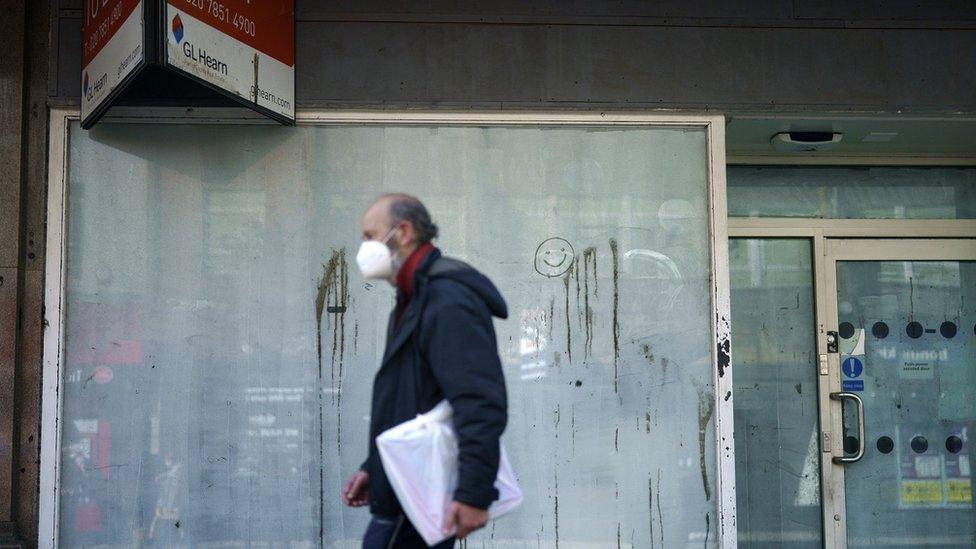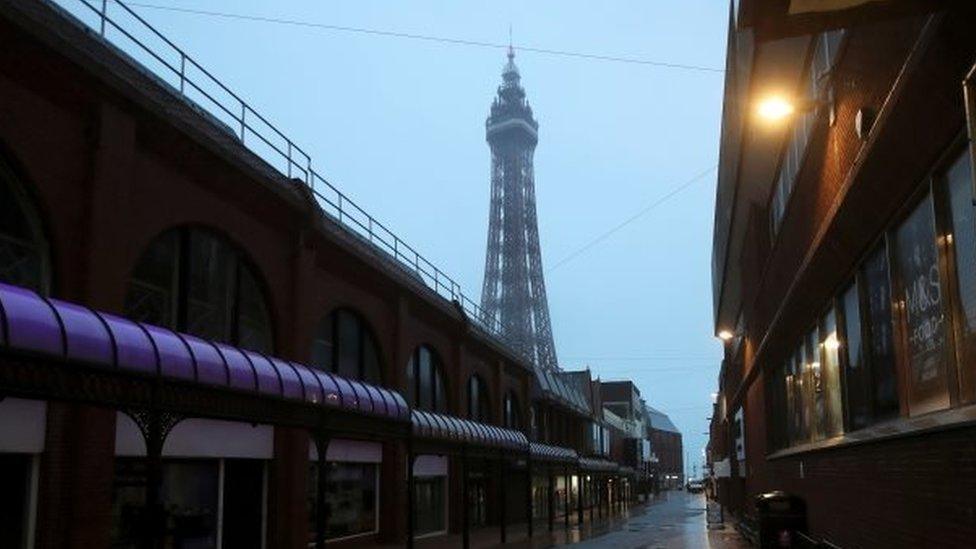Budget 2021: Funding for Tory-held towns 'looks fishy,' says Starmer
- Published
- comments
Sir Keir Starmer: Allocations from Towns Fund "looks fishy"
Labour's leader has accused ministers of favouring Conservative areas for funding under a £1bn scheme to boost struggling towns in England.
Sir Keir Starmer said regeneration money for 45 towns announced at the Budget "looks fishy" because the large majority are represented by Tory MPs.
He called for criteria for the allocations, made under the Towns Fund, to be published.
But Boris Johnson said the funding process was "completely impartial".
The prime minister added that it was "just a basic electoral fact" that more towns now have a Conservative MP after the December 2019 general election.
On Wednesday, Chancellor Rishi Sunak announced £1bn for 45 towns under the Towns Fund scheme, which aims to help struggling areas.
They are among a total of 101 towns that are scheduled to share funding, external from the scheme, following a selection process that ended in September 2019.
The towns received varying amounts under the scheme, with a number receiving at or close to the £25m maximum normally allowed.
Speaking on Thursday, Sir Keir said 40 out of the 45 towns had a Tory MP, adding: "Lots of people would scratch their head and say, 'what is going on here?'"
He said the funding announcement "feels like pork-barrel politics" - a term used to describe when politicians get funding for their area in return for voters' support.
"This should be going where it's really needed, and the government needs to publish the criteria for this," he told reporters.
"If you end up with a list of 45 areas where the funding's going in, and by co-incidence 40 of them are where there's a Conservative MP, I think most people are saying 'what's going on here, this looks fishy.'"

Bolton has been given £22.9m under the Towns Fund scheme

Where's the money going?
Analysis by Peter Barnes, the BBC's head of political research
There are 45 towns named but as some cover multiple constituencies, I've counted 56 constituencies that benefit.
Forty-seven are Conservative constituencies - including 14 gained from Labour at the 2019 election plus quite a few more recent Conservative gains, while nine are Labour constituencies.
Fifty-three of the constituencies voted "leave" at the EU referendum. Three voted "remain".
In a way that's not very surprising - Labour seats and "remain" areas are concentrated in cities - but it's still pretty striking.

Mr Johnson defended the process used to allocate funding to towns, on a visit to Teesside to promote the government's freeports scheme, also aimed at boosting neglected areas.
"One of the functions of the election clearly is that there are a lot of Conservative-represented towns. I think it's just a basic electoral fact," he said.
"I've asked about this, and I'm told that the criteria are entirely objective and they look at all sorts of data, poverty, employment and so on.
"We want to unite and level up across the whole country, we want to do it in a completely impartial way, so that's what we'll continue to do."
He added that if some areas "feel that they've missed out", the government will look at their case too.
Jake Berry, who represents Rossendale and Darwen in Lancashire, and chairs the Northern Research Group of Tory MPs, said Labour had "let down" voters in its former so-called 'Red Wall' seats.
"I doubt telling those same voters that the Conservatives are now fighting and delivering for them is going to win them back," he added.
Selection criticism
The government has previously come under fire from MPs and the UK's spending watchdog over how the 101 towns were selected for the scheme.
Ministers picked the towns from a pool of 541 places, which had been ranked by officials based on local need and growth potential.
They chose all 40 towns classed by officials as "high-priority," then selected a further 60 places from the low and medium priority categories.
But the Commons Public Accounts Committee said it was "not convinced by the rationales for selecting some towns and not others".
In a report, it added that justifications offered by ministers for picking some areas over others were "vague and based on sweeping assumptions".
A spokesperson for the Ministry of Housing, Communities and Local Government said the selection process was "comprehensive, robust and fair".
"Proposals are assessed by officials - not ministers - in the order they are submitted and offers are based solely on the strength of the proposals assessed by officials at the department," they added.

New town deals and amount per region
North East: Middlesbrough; Thornaby-On-Tees - £46m
North West: Preston; Workington; Bolton; Cheadle; Carlisle; Leyland; Southport; Rochdale - £211m
Yorkshire and the Humber: Wakefield; Whitby; Scarborough; Grimsby; Castleford; Goldthorpe; Scunthorpe; Morley; Stocksbridge - £199m
East Midlands: Newark; Clay Cross; Skegness; Mablethorpe; Boston; Lincoln; Northampton; Staveley; Mansfield - £175m
West Midlands: Wolverhampton; Kidsgrove; Rowley Regis; Smethwick; West Bromwich; Burton-upon-Trent; Nuneaton - £155m
East of England: Lowestoft; Colchester; Stevenage; Great Yarmouth; Ipswich; Milton Keynes - £148m
South East: Crawley; Margate - £43m
South West: Swindon; Bournemouth - £41m
Related topics
- Published11 November 2020
